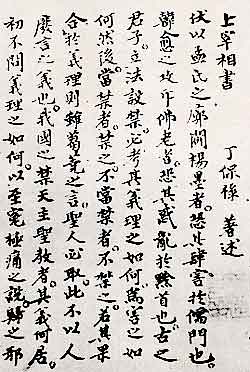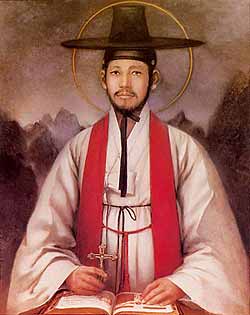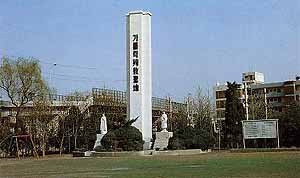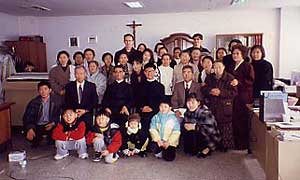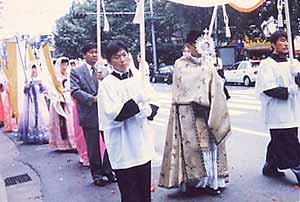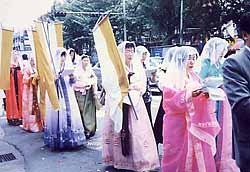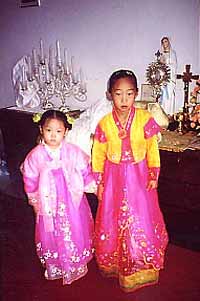

![]()
![]()
|
History of Asian Missions FOR
THE MISSIONS OF ASIA I
- History of the Asian Missions - Korea - Part 2
After the persecution of 1791, King Chong-jo, who was lenient to the Catholics, passed away, and Queen Chong-sun representing her 11-year old great grandson King Sun-jo, took power in 1800. She hated the Catholics, and started a new persecution. The queen considered the Catholic religion a downright heresy harmful to the customs and the tradition of the country. In 1801, the queen decided to eradicate all Catholics and imprisoned Catholics of all classes. She gave an order to punish the relatives of the Catholics. Almost 300 Catholics were killed during this persecution, including Father Valloso (Chu), who was martyred in Saenamt’o (by the Han River) on May 30, 1801. After this persecution all Catholics of the nobility were either killed or sent to exile. Those, who survived the persecution, escaped deep into the mountains, and many of them starved to death. In this mountainous areas new Catholic communities were formed. The members shared what they had with one another, and practiced their faith without a priest almost thirty years. Even in these difficult times, the Catholics continued to write to the bishop of Peking begging for priests. According to a letter the Korean Catholics sent to Pope Pius VII, there were more than ten thousand Catholics. But during the persecution of 1815 hundreds of Catholics in rural Catholic communities were arrested, and more than 30 of them were killed. In 1817, two priests attempted to enter the country but with no success. The Holy See tried to send missionaries to Korea, but none could enter because of a new persecution in 1827, during which hundreds of Catholics were arrested and many were killed. Amid the severe persecutions, some people like Chong Ha-sang Paul visited Peking more than ten times to appeal for priests. As a result of these efforts, the Vicariate Apostolic of Korea was formally established as of September 9, 1831, and the Paris Foreign Mission Society (M.E.P.) was asked to be in charge of spreading the faith in Korea. The first Vicar Apostolic of Korea was Bishop Barthélemy Bruguière. He unsuccessfully tried to enter Korea, and died in Mongolia on October 20, 1835. In 1836, Bishop Laurent Marie Joseph Imbert was named the second Vicar Apostolic of Korea. Bishop Imbert successfully crossed the Yalu River to enter this country on December 31, 1837, six years after the establishment of the Vicariate Apostolic of Korea in 1831. By 1838, Korea had a bishop, two priests and more than nine thousand Catholics.
Letter
composed by St. Chang Ha-sang Paul In 1839, however, those who didn’t like the Catholics came to power again. The fact that the French missionaries were in the country became known to the government, and a new persecution started throughout the country. Due to the severe persecution, the Catholic Church lost the bishop, the priests and many leading lay Catholics. The survivors again were forced to escape to the mountains. The three French missionaries were beheaded in Saenamt’o on September 21, 1839, after severe tortures.
The
first Korean priest, Kim Tae-gon Andrew, Later, in 1843, Bishop Ferréol was appointed the third Vicar Apostolic of Korea, and enter Korea by sea with Father Marie Nicolas Antoine Daveluy and Father Andrew Kim Tae-gon, the first Korean priest, on October 12, 1845. Father Kim Tae-gon Andrew was beheaded a year later in Saenamt’o on September 16, 1846. Father Ch’oe Yang-ob Thomas, the second Korean priest, entered Korea at the end of December, 1849, after many attempts.
Saenamt'o,
Seoul - There was a small persecution in 1860. According to the report of Bishop Berneux just before the major persecution of 1866, the number of paschal confessions was 14,433; annual confessions: 3,493; adult baptisms: 970; pagan infant baptisms: 11,106. The Catholics numbered 23,000. (Source:
"Lives of the 103 Martyrs Saints of Korea", Seoul, 1984,
pp.8-9) The
Our Father in XIXth century Korean characters [not yet
reproduced online]
St. Jacques Chastan, M.E.P. Extracts of two letters. 1)
" (...) In spite of the danger of death, the number of Christians
multiplies daily. The harvest has not been less abundant
this year than last year. I had about 1100 baptisms, my
confrere 1400. I have received many consolation in this
second pastoral visit: it has been for me and those poor spiritual
children a great joy to meet once more. I found them better
instructed in religion, more fervent in the service of the Lord,
having kept quite faithfully the grace of the sacraments...
I have to travel about 1500 km, mostly through places covered
with snow, with ice, over the mountains. All this is little
when we think of what Our Lord endured for our souls. How
sweet it is to be able to suffer something in gratitude to His
infinite love..." 2) On August 23, 1839, the 2 French Missionaries received this note from their now-captured bishop, (Saint) Mgr. Imbert: "Bonus pastor ponit animam suam pro ovibus suis. Si nondum estis profecti per cymbam, venite cum misso Son Kie Tsong -- The good shepherd gives his life for his sheep. If you haven’t yet left by boat, come with the envoy Son Kie Tsong." The bishop who, at first, was resolved to protect his two missionaries, finally gave in. Plunged in the frightening heart of Korean prisons, tortured, daily exposed to the sight the tortures endured by his three main catechists, this man so hard on himself had not been able to resist the spectacle of the tortures of his flock. At the end, this very rigorous apostolic Vicar of Korea took a decision which is exceptional in the history of the Church: to ask his 2 priests (all his clergy) to hand themselves over... Soon after receiving this note, St Jacques wrote his last letter to his parents: "My dearest parents, may the peace of Our dear Lord be with you... In the last 15 years, this dear mission enjoyed a real tranquility rarely disturbed. The Christians who had been dispersed in the last persecution had been able to get together, since the arrival of the missionaries, there were jubilant, and the presence of His Excellency had fulfilled our desires. This joy did not remain long undisturbed since about 100 Christians were caught, their fortune taken, their bodies beaten, and worse, their souls having become the enemies of God by apostasy. This year the devil has doubled his rage. The persecution much more cruel has in fact become much more glorious by the constancy of martyrs of all age, of both sexes, of all conditions. In the space of two months, 25 people got beheaded after undergoing long and awful torments. 5 others actually died in these torments of as a result of them. More than 150 persons, now in prison, await the same fate. A single word of apostasy could free them from these horrible prisons where they suffer a long martyrdom, but the grace of the Lord strengthens them so well that they accept with joy all these torments. How happy will they be if they persevere until the end. For 4 months we have hidden ourselves thanks to some Christians, and we would have done it longer if a higher order had not obliged us to reveal ourselves. His Excellency, our bishop, judges that in our present circumstances, it is the duty of a good shepherd to give his life to save his sheep; he has himself given the example by delivering himself... A single victim will not suffice to the rage of the persecutors, they will have three. The order to hide has kept us in hiding, the order to manifest ourselves is as welcome as the first. In all things, the will of God, the fulfilment of his good pleasure. I have always loved you, always cherished you while on earth, be assured that I will never forget you if God grants me to enter Heaven through the door of martyrdom... My dearest father, mother, brothers and sisters, relatives and friends, as it is most probably the last time I have the honour to write you, deign accept my last farewell... I have to go, I can’t write any longer... While waiting to see each other again in Heaven where I am going to prepare for you a place, love the Lord your God with all your heart, with all your soul, with all your strength, love also the dear neighbor as yourselves and you will infallibly receive the happiness to find yourselves at our "rendezvous" in the Sacred Heart of Jesus and Mary. I have the honour to be in the tenderest bonds and in the most affectuous charity that a son can have for his father, mother, brothers, sisters, your most humble and devoted son. Jacques
Sources:
"Mourir pour la Corée", Paris, 1996, pp. 230-1,
258-262 As in 1784, the revival of tradition in the 1980s in Korea began with a prayer group of lay people, it was led by Professor Kim. Refusing with their "sensus fidei" (instinct of faith) communion in the hand, they welcomed with joy the news brought by a new member to the group Mr. Stephen Kim, just arrived from the USA, that there existed in the USA a wide traditional movement. Soon after another member, Dr. Maria Kim had to go to the US for professional reasons and pursuing their research for this traditional group, got in touch with Fr. Williamson asking him a priest for Korea. The first SSPX Fr. Patrice Laroche, a pioneer in many SSPX new missions, was the first to visit these faithful in Korea in the summer of 1988. But it wasn’t long for the Superior General of the SSPX, Rev. Fr. F. Schmidberger to visit them, himself. Fr. P. Laroche came afterwards a few more times from Europe until the Australian District of SSPX took Korea under its wings... Finally, in July 1993, the Philippine Autonomous House with the assignment of newly ordained Japanese priest Fr. Thomas Marie Onoda, guaranteed regular monthly masses, and other Catholic activities.
The faithful of the Seoul Mass Center
On
the feast of Christ the King,
For the occasion, the faithful put on their traditional dresses...
...as do the children.
|
